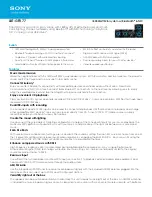
As long as the functions of the [Horizon] menu are not activated, the 3SX’s function is identical with the 3X’s function.
SETTING UP THE 3SX
Important: The 3SX does not allow „exceptions“ during the setup procedure, particularly the coll.pitch travel has to reach its 100% marks as displayed in the
[Diagnose] menu, positive and negative, with the correct direction, and, for using any of the extended 3D options, the angle of attack has to be exactly 0° when
connected to the [Diagnose] or [Trim] menu. If this is not the case, fi rst complete the setup according to manual or wizard. Otherwise a proper function of the
3SX’s additional features can not be ensured.
HORIZONTAL STABILISER
The horizontal stabilisation can be used for various purposes, e.g. as support during photographic fl ights, particularly in greater distances, or as a training aid for
beginners, or as a safety feature during acro fl ight training, using the stabilisation only as a „rescue switch“ in an emergency case.
HOW TO ACTIVATE THE HORIZONTAL STABILISER
Using FBL-helicopters without fl ybar, fi rst optimise the Rigid stabilisation. For fl ybared helicopters, see the section „Trimming neutral“ below. Then read the
resulting gain-setting of the head-gyro channel from the [Diagnose] menu (not from the transmitter, values may differ!) and enter this value as default setting into
the [Rigid] menu. Now the head-gyro channel is free for the use of the Horizon option. To activate Horizon-Mode, use the [Horizon] menu to switch the channel
assignment from ‚Rigid gain‘ to ‚Horizon‘. Using the head-gyro channel, you can now control the strength (gain) of the Hor-Mode during fl ight. To this end we
suggest to use a switch or better a pot or slider at the transmitter for instant adjustment access. Note that the 3D options act depending on the signal polarity (di-
rection) given at the head-gyro channel (concerning the automatic coll.pitch action, see below). Stronger gain means quicker self-levelling and more necessary
stick defl ection, for example to decelerate a fast fl ight. The [agility] setting in the [Rigid] menu always affects the Horizon gain too.
FLYING WITH HORIZONTAL STABILISATION
Before starting the motor, ensure that the swashplate remains in approximate horizontal position while activating the
Hor-stabilisation. It must not run into an end-blocking!
Important: Begin with small stabilisation gain and increase carefully.
Rigid stabilisation, set at high level, may increase a tendency to oscillate. In this case it may be helpful to just slightly reduce the rigid gain, allowing a large
increase of horizontal gain. Normally, take-off and landing is possible with activated Hor-Mode. This should be tested fi rst with a gain not higher than 30%. Some
large helicopters however are susceptible to a collision of main rotor and tail boom, if harsh elevator-back commands are given. This can be checked by whether
the rotor blade bends down to that point when pushed hardly enough. In this case, the horizontal gain and/or the [Mixer] menu (servo ways) have to be adjusted
so that the swashplate inclinations are limited to an appropriate elevation, and the Hor-Mode should be switched off during take-off and landing. The tendency to
oscillations may be increased before take-off, if the skids are standing on a hard surface and during fast fl ight. Therefore, in both cases the gain setting should
be tested. Important: If fl ying with permanently engaged Hor. stabilisation, do not reduce travels for aileron or elevator at the transmitter (dual rate). Otherwise,
the priority of the manual control (override), which is necessary for safety reason, may get lost. Therefore, allow a travel reduction (dual rate) at the transmitter
only when the Hor-Mode is disabled (otherwise reduce either the maximum signal of the head-gyro channel in the same proportion as the travel has been dimini-
shed, or increase the ‘Manual override’ slider in the [Horizon] menu to at least the value which is in reciprocal proportion higher than its minimum end).
The Horizon stabilisation can make pirouettes out-of-round, since it aims to bring the main rotor plane into its neutral hover attitude (adjustable in the [RC]
menu): for round pirouettes reduce the Horizontal strength (gain) and/or increase the Rigid stabilisation.
11
PARTICULAR FEATURES OF THE 3SX




































